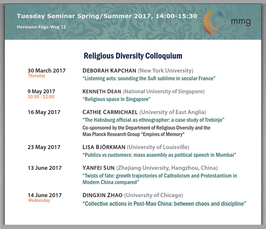"From the household to the individual? Towards religious subjectification in contemporary China"
Religious Diversity Colloquium Spring/Summer 2017
- Date: Jun 20, 2017
- Time: 02:00 PM - 03:30 PM (Local Time Germany)
- Speaker: Adam Chau (University of Cambridge)
- Adam Yuet Chau (PhD in Anthropology, 2001, Stanford University) is University Senior Lecturer in the Anthropology of Modern China in the Department of East Asian Studies, University of Cambridge, and a Fellow at St. John’s College. He is the author of Miraculous Response: Doing Popular Religion in Contemporary China (Stanford University Press 2006) and editor of Religion in Contemporary China: Revitalization and Innovation (Routledge 2011). He is currently working on projects investigating the rise of the ‘religion sphere‘ (zongjiaojie) in modern China; the idiom of hosting and forms of powerful writing (“text acts”) in Chinese political and religious culture.
- Location: MPI-MMG, Hermann-Föge-Weg 12, Göttingen
- Room: Conference Room

For more details please contact vdvoffice(at)mmg.mpg.de.
Traditionally the household (jiahu) served as the most basic unit of religious and ritual engagements in Chinese society. It was the household that featured most prominently as the sponsor of funeral rituals and as the unit contributor to village New Year’s festivities, temple festivals and communal exorcisms, thus manifesting the household’s sovereignty. In contemporary China, however, the individual has come forth as an increasingly salient unit of religious engagement, threatening to conflict with and even replace the household as the prime mover of Chinese religious life, especially in urban China. More and more religious forces are interpellating the individual into particular religiously-informed lifestyles all the while the individual is becoming more and more predisposed to embracing such lifestyle. I will examine a few prominent examples of such processes of religious subjectification: 1) conversion to Christianity and becoming spiritual dependents (guiyi, particularly strong in lay Buddhism); 2) ‘karmateering’ (volunteering for karmic merits) and other forms of volunteering associated with religious beliefs; and 3) person-to-person proselytising (e.g. deploying concepts such as yuanfen, ‘karmic connections’, in Buddhist proselytising).